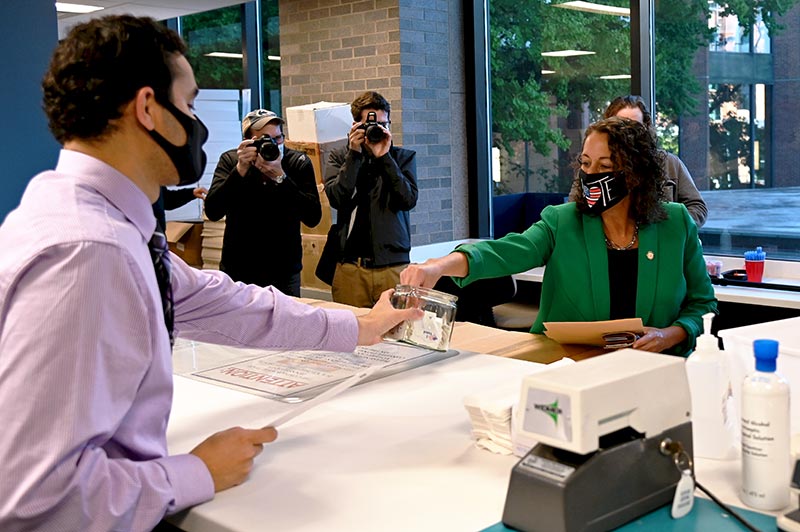Five (5) new cases added Tuesday in Lycoming County now at 835 cases, no new deaths, one new death, 29 total deaths, with 14,575 negatives according to DOH report.
Department of Health Provides Update on COVID-19,
1,342 Positives Bring Statewide Total to 174,646
Pennsylvanians Urged to Download COVID Alert PA App
Harrisburg, PA – The Pennsylvania Department of Health today confirmed as of 12:00 a.m., October 13, that there were 1,342 additional positive cases of COVID-19, bringing the statewide total to 174,646. All 67 counties in Pennsylvania have cases of COVID-19.
The number of tests administered within the last 7 days between October 6 and October 12 is 249,065 with 9,097 positive cases. There were 34,023 test results reported to the department through 10 p.m., October 12.
There are 8,384 total deaths attributed to COVID-19, an increase of 16 new deaths reported. County-specific information and a statewide map are available on the COVID-19 Data Dashboard.
“We know that congregation, especially in college and university settings, yields increased case counts. The mitigation efforts in place now are essential to flattening the curve and saving lives,” Secretary of Health Dr. Rachel Levine said. “Wearing a mask, practicing social distancing, and following the requirements set forth in the orders for bars and restaurants, gatherings, and telework will help keep our case counts low. Make your phone part of the fight against COVID-19 today by downloading the COVID Alert PA exposure notification app. Together, as Pennsylvanians, all of our efforts are designed to support our communities to ensure that cases of COVID-19 remain low.”
Mask-wearing is required in all businesses and whenever leaving home. Consistent mask-wearing is critical to preventing the spread of COVID-19.
There are 1,280 cases who have a positive viral antigen test and are considered probable cases and 647 patients who have a positive serology test and either COVID-19 symptoms or a high-risk exposure.
There are 2,060,093 patients who have tested negative to date. Of the patients who have tested positive to date the age breakdown is as follows:
- Approximately 1% are ages 0-4;
- Nearly 2% are ages 5-12;
- Nearly 5% are ages 13-18;
- Nearly 14% are ages 19-24;
- Nearly 36% are ages 25-49;
- Approximately 21% are ages 50-64; and
- Approximately 21% are ages 65 or older.
Most of the patients hospitalized are ages 65 or older, and most of the deaths have occurred in patients 65 or older. More data is available here.
The department is seeing significant increases in the number of COVID-19 cases among younger age groups, particularly 19 to 24-year-olds. An alert was sent to healthcare providers about the changing COVID-19 case demographics, as there are more cases in younger age groups than in those 50-64 and 65+. The following regions saw significant increases among 19 to 24-year-olds in each month from April to present in October:
- NC – Approximately 7 percent of cases in April to nearly 36 percent of cases so far in October;
- SE – Nearly 5 percent of cases in April to nearly 18 percent of cases so far in October;
- NE – 6 percent of cases in April to approximately 20 percent of cases so far in October;
- NW – Nearly 7 percent of cases in April to approximately 21 percent of cases so far in October;
- SW – Approximately 5 percent of cases in April to nearly 14 percent of cases so far in October; and
- SC – Approximately 7 percent of cases in April to nearly 11 percent of cases so far in October.
In nursing and personal care homes, there are 24,060 resident cases of COVID-19, and 5,311 cases among employees, for a total of 29,371 at 1,010 distinct facilities in 61 counties. Out of our total deaths, 5,553 have occurred in residents from nursing or personal care facilities. A county breakdown can be found here.
Approximately 11,405 of our total cases are among health care workers.
Currently, all 67 counties are in the green phase of reopening.
The Wolf Administration stresses the role Pennsylvanians play in helping to reduce the spread of COVID-19:
- Wash your hands with soap and water for at least 20 seconds or use hand sanitizer if soap and water are not available.
- Cover any coughs or sneezes with your elbow, not your hands.
- Clean surfaces frequently.
- Stay home to avoid spreading COVID-19, especially if you are unwell.
- If you must go out, you are required to wear a mask when in a business or where it is difficult to maintain proper social distancing.
- Download the COVID Alert PA app and make your phone part of the fight. The free app can be found in the Google Play Store and the Apple App Store by searching for “covid alert pa.
Updated Coronavirus Links: Press Releases, State Lab Photos, Graphics
- Daily COVID-19 Report
- Press releases regarding coronavirus
- Latest information on the coronavirus
- Photos of the state’s lab in Exton (for download and use)
- Coronavirus and preparedness graphics (located at the bottom of the page)
- Community preparedness and procedures materials
All Pennsylvania residents are encouraged to sign up for AlertPA, a text notification system for health, weather, and other important alerts like COVID-19 updates from commonwealth agencies. Residents can sign up online at www.ready.pa.gov/BeInformed/Signup-For-Alerts.








